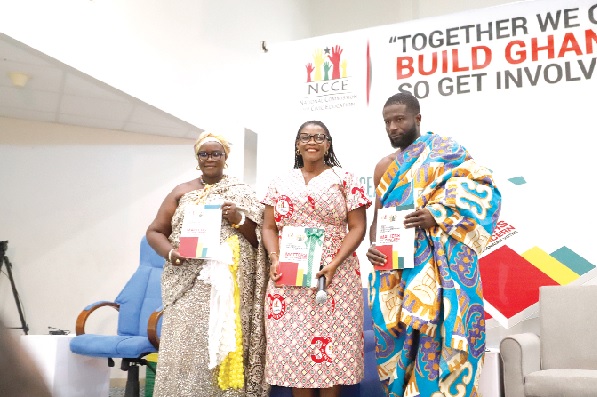
Election 2024: Matters of concern to the Ghanaian voter
SINCE the 2004 election, the National Commission for Civic Education (NCCE) has produced an election-year report titled “Matters of Concern to The Ghanaian Voter.”
This year’s report was launched on Wednesday, October 23, 2024, at the premises of the Ghana Shippers Authority.
In this piece, I share a few highlights from the report. To start, there are two overarching points worth noting. First, the NCCE must be commended for this very important work going back to the 2004 election.
Anyone with a history of undertaking field research in Ghana will appreciate the challenges involved and the resources-both financial and human – it takes to successfully complete such an endeavour.
The excellent final report produced by the NCCE is a combination of careful planning, navigating difficult terrains and staying focused to collect and analyse data needed to enrich our election year conversation.
If you are unfamiliar with this report by the NCCE, I strongly urge you to not only look at this year’s report but also those from previous years.
Second, the methodology used to undertake these research endeavours tends to receive a lot of scrutiny, particularly the sampling techniques used for data collection.
The study’s methodology passes the rigour test. It is especially noteworthy the extra steps taken to ensure that the sample drawn was very representative.
More important, it is the only study I have seen so far that is intentional about the inclusion of Persons With Disabilities (PWDs) in its sample.
Key findings
Voting intentions. When asked whether they intended to vote in the upcoming elections, eight of out 10 (81 per cent) Ghanaians indicated a willingness to vote in both the presidential and parliamentary elections.
Voting is a core activity in democracies. It is, therefore, encouraging to see such high percentages of Ghanaians indicating a willingness to vote.
This is also important because, in the Afrobarometer survey, Ghanaians keep saying elections should be the mechanism by which we choose our leaders.
The study, however, showed some variations along gender lines with more men indicating a willingness to vote than women.
Also, in terms of age, older voters indicated a willingness to vote more than younger voters. Finally, the regional variations are very instructive with voters in Greater Accra having the lowest percentage of voters indicating a willingness to vote.
What drives voters?
The top three factors driving a voter’s choice of presidential, as well as parliamentary candidate are policies and promises; track record and experience; and party affiliation.
For the presidential election, I note that only two out of three (23 per cent) said the choice of running mate is a driving factor. This confirms previous findings from Prof. Owusu Mensah (2016) and the iRIS Research Group (2020) which found very limited impact of the running mate in a voter’s calculus of who to vote for.
Women who run for office. In the 2012 report, when the question was first asked about willingness to vote for a female presidential candidate, 50 per cent answered affirmatively. This increased to 59 per cent in 2016, and 66 per cent in 2020.
The 2024 report shows 64 per cent saying they are willing to vote for a female presidential candidate. In the case of female parliamentary candidates, the percentages are as follows – a) 70 per cent in 2012; b) 68 per cent in 2016; c) 76 per cent in 2020; and d) 72 per cent in 2024.
Although a four-percentage point drop, Ghanaians appear more willing to vote for a female parliamentary than a presidential candidate.
Key issues of importance.
Ghanaians ranked the following as the top five issues of importance in this election: 1 - Education, 2- Employment, 3- Health, 4- Roads and Infrastructure and 5 - Economy.
On the top-ranked issue (Education), when asked what specifically should be addressed, respondents said “address the challenges associated with Free SHS.”
This is a strong signal because so far, the Free SHS debate has been framed as a binary conversation of who will keep it versus who will cancel it.
Election architecture
The study captures some worrying red flags – a) one per cent indicates a willingness to engage in electoral violence; b) trust in the electoral system has dropped 20 percentage points between the 2020 study (62 per cent) and the current study (42 per cent); c) as many as four out of ten (43 per cent) say they don’t know if they trust the Electoral Commission; and d) seven out of 10 (69 per cent) believe vote buying is somewhat/extremely prevalent in our elections.
These are just selected highlights of the many rich insights contained in the report.
I urge all stakeholders to use this report to frame important election-related conversations in the time left between now and December 7, 2024.
The writer is the Project Director, Democracy Project.
